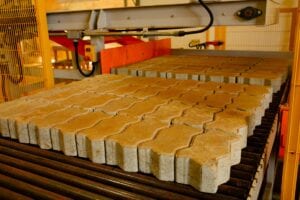Vale (Rio de Janeiro, Brazil) inaugurated the Pico Block plant, the first pilot plant for civil construction products made from tailings from mining activities. The plant, which has been set up at the Pico mine, in the city of Itabirito, Minas Gerais, is designed to foster the circular economy within local iron ore processing activities. After the testing period, Vale estimates that 30,000 tons/year of tailings that would be otherwise disposed of in dams or piles will be transformed into 3.8 million pre-molded products with a variety of applications in the civil construction industry. Products include interlocking flooring, structural concrete blocks, sealing blocks, concrete plates, shackles, sealing blocks, among others.

The plant manufactures blocks and parts using tailings from mining activities as the primary material. | Photo: Produtora Guarda chuva
According to Vale’s executive manager for Environmental Licensing, Rodrigo Dutra, the initiative to reuse tailings is the first of its kind in the company. “In addition to making our operations safer and more sustainable, we want to encourage the development of innovative solutions that create value for neighboring communities and society.”
Vale has been studying options for reusing and recycling tailings since 2014. Its use in civil construction in place of natural sand is also a green solution. According to the United Nations, sand is the world’s second-most heavily exploited resource after water. The material is scarce and subject to illegal and predatory extraction at a global level. “Vale’s sandy tailings resulting from ore processing activities have a high silica content and a very low iron content, in addition to a high degree of chemical homogeneity and optimum grain-size uniformity,” Dutra highlighted.
The company will invest approximately R$25 million ($4.6 million) in technological research and development (R&D) in the first two years of operation of the Pico Block plant, which will receive technical support from the Federal Center for Technological Education of Minas Gerais (CEFET-MG). The support team allocated in this phase will comprise 10 researchers from the institution – such as professors, laboratory technicians, and students of graduate, undergraduate and technical courses.
“The main advantage of being in a plant inside a mining unit is the ability to study the application of various wastes and validate the technology developed in the laboratory in the production environment, on an industrial scale. This model will enable the transfer of technology in a more efficient way, in an environment that drives innovation,” explained Augusto Bezerra, lead researcher of the project and professor at CEFET-MG. No products will be sold during the R&D phase.
The block plant occupies an area of 10,000 sqm within the Pico mine unit at the Vargem Grande complex. “The plant was designed in modules for versatile development of various types of products for civil construction, such as transport infrastructure, housing and urban development works,” explained Laís Resende, one of the engineers responsible for the initiative.
The plant’s entire production system is automated and built according to occupational health and safety standards, therefore avoiding physical strain as the staff handles the parts. According to the executive manager of the Vargem Grande complex Karina Rapucci, Vale incorporated sustainability in every aspect of the plant. “In addition to reusing tailings, the plant offers a safe, ergonomic and comfortable work environment. This project is also aligned with the movement for diversity and inclusion in mining – it has been implemented and will be operated by women.”
Eight women will oversee all the plant’s processes. Ana Luiza Marinho, a resident of Itabirito, was one of the women hired to work at the plant. “It is a privilege to have been selected to work as engineer in an initiative that follows the principles of circular economy, that reuses tailings as primary material for its products while helping reduce the extraction of non-renewable natural resources. I believe that the purpose behind the creation of a block plant run by a team of women is proof that the company is evolving, that it is looking ahead in the future, and it is taking care of the communities surrounding its operations.”
Vale plans to replicate the block plant in other units in Minas Gerais once the R&D phase at the Pico mine is completed. The company also combines efforts with more than 30 organizations including universities, research centers and Brazilian and foreign companies to develop solutions for reusing mining tailings in different industrial sectors.